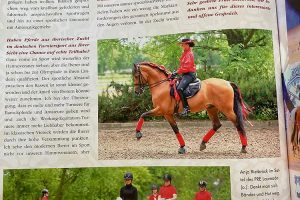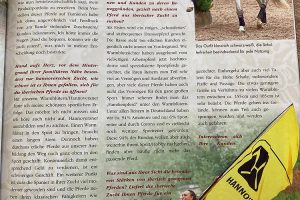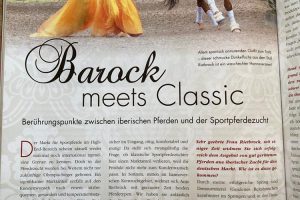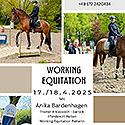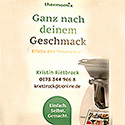
The market for high-end sport horses currently seems to know no limits, neither nationally nor internationally. But by far not only future Olympic winners are born in horse breeding. A significant share of the market is accounted for by the customer’s desire for a riding horse that is comfortable to sit on, healthy and stable in temperament for a variety of uses, which should above all provide one thing for the amateur who is quite well-to-do: Pleasure and relaxation. However, customers report more and more often that they hardly find what they are looking for in the segment of classic sport horse breeds. As a result, quite a few of these customers are increasingly turning to the Iberian breeds. They describe these horses as easy to sit, safe to handle, rideable, comfortable and courageous! This inevitably raises the question of whether classical sport horse breeders are losing a market share here because their product no longer fits the customer’s wishes. In Sottrum, in the middle of Hanover’s core breeding area, Anja Rietbrock has been devoting herself to both types of horses for quite some time. We visited her on the occasion of her event “Baroque meets Classic” at her facility in Sottrum and were able to ask her a few questions, for example, how her commitment to Iberian horses came about, what she particularly appreciates about them and whether perhaps German breeders can also draw something from this wealth of experience with regard to the definition of the breeding objective in their own business.
Dear Mrs. Rietbrock, for some time now you have successfully dedicated yourself to offering well-ridden horses from Iberian breeding for the German market. How did this come about?
Due to my successful jumping and dressage riding (Golden Riding Badge combined in jumping and dressage) I have always been at home in different saddles, but now my back occasionally gives me trouble when sitting out our spirited warmbloods. Most professional sport riders can certainly tell you a thing or two about the fact that it is often only possible to sit really harmoniously on our warmbloods for a certain amount of time. Many colleagues have told me that they stop active sport already in their mid-40s. Since I have always had a small passion for exotic horse breeds, I bought an Iberian ten years ago. In the following years I bought one every now and then.
bought one. In the course of time I became aware that there is a market for Iberian horses. Since I have to manage a riding facility, I then took the opportunity to further expand the trade, but also the training of this breed, which is easy to ride, in order to, as they say in business management terms, expand my product portfolio. When presenting these horses at shows, I then received an unusual amount of feedback from spectators/customers standing on the sidelines. I always heard the questions “Are they comfortable, can we ride them?”, which reinforced my decision.
Hand on heart, against the background of your family closeness especially to the Hanoverian breed, how difficult was it for you to open up to the Iberian horses?
I had my best sporting successes with our warmbloods/Hanoverians. I don’t want to miss that and I won’t stop training and breeding Hanoverians. It takes a lot of patience to bring a warmblood into sport. Nevertheless, quite a few horses from our training have made their way to the top of the sport. To continuously earn money with them is a difficult business. Another point is that the Spaniards have become much more modern in their breeding and the horses have achieved more movement and impulsion in the trot in addition to their classical abilities such as collection. Due to their often applied diligence, it is possible to ride these horses with rather little effort.
What do you see as the most significant differences in the demands on husbandry, feeding, riding style and training?
The Iberian horses are happy with less concentrated feed, they rather manage with meagre feed. As I also have some younger horses in training, it has been shown that they are more intrepid and can be ridden very quickly, even by amateurs. When clients try them out, I sometimes ask myself who actually wants to ride a medium trot.
ride. For most of them, the focus is on sitting comfortably, leaning against the bit and rideability.
What do your clients tell you about their reasons for specifically looking for an Iberian-bred horse?
What do your customers tell you about their reasons for specifically looking for an Iberian-bred horse?
First of all, they are looking for a dressage horse that is easy to ride, “shoot-proof” and comfortable to sit on. The breed is actually not always in the foreground for many customers. We warmblood breeders, starting from the versatile working horse, have now bred highly modern and specialised sport horses, some of which demand a lot of ability and endurance from their riders, but many of these horses do not have the ability for the very big sport. The “family horse” is becoming increasingly rare among warmbloods. Among all riders in Germany we have about 94 % amateurs and only 6 % sport riders, and with Corona there are perhaps even fewer sport riders. However, these 94 % of customers want to continue to pursue their sport/hobby, but often no longer find the right horse.
In your opinion, what are the special strengths of Iberian-bred horses? Does the Iberian breed supply you with horses for a very specific segment on the market or can you accommodate very different customer wishes?
The Iberian was originally bred for endurance, courage and agility for driving cattle, bullfighting and fiesta. But it also has a lot of talent for the high school, especially piaffe and passage. The somewhat smaller ‘size in relation to many warmbloods between approx. 155 cm and 165 cm is very popular. The horses go cross-country, some can be jumped and are also driven.
Are your customers mostly interested in a riding horse for individual private pleasure?
A clear yes: The private pleasure is in the foreground. Often the woman comes to me, and a short time later some of the men also want to ride again and so both of them can go cross-country together again, for example. I have had long-standing warmblood riders, some of whom have also ridden sportily, as clients because they wanted a rideable and comfortable horse for private pleasure. Metaphorically speaking: away from the hard-suspended and demanding sports car and towards a sporty limousine with automatic transmission.
In your opinion, do horses from Iberian breeding have a chance to really participate in the German show sport?
The Hanoverian will continue to be at the forefront of the sport, but the Iberians are already bıs qualified for the Olympics in their countries. The sporting gap between the breeds has thus become smaller and the share of Iberians could increase further. I am convinced that there will be more and more competitions for baroque horses and amateurs and that working equitation competitions will also become more and more popular. In the classical arena, the Iberians will score points because of their high collection. I don’t see the modern Iberian in front of our Hanoverians in the sport, but I would be happy if he were crossed in front of other “foreign horses” in order to get back more rideability and shooting strength.
On your farm it seems to be more about a both/and rather than an either/or. Can you tell German breeders something from your experience that could help them to win back these groups of buyers in the future?
With our increasingly specialised breeding goals, we have lost sight of the market requirements of the entire spectrum. In breeding, more and more attention has been paid to the mechanics of movement and less to the rideability, it should always be higher, swinging and more exalted, which has led to very sensitive horses that are high in blood.
blood. Here we have to rethink a bit again. Dear breeders, we need horses that can not only be ridden by very strong riders and professionals, but that have a clear head and can also be sold as amateur or family horses if necessary, if they are not suitable for the very big sport in terms of their talent.
Dear Ms Rietbrock, thank you for this interesting and open interview.



